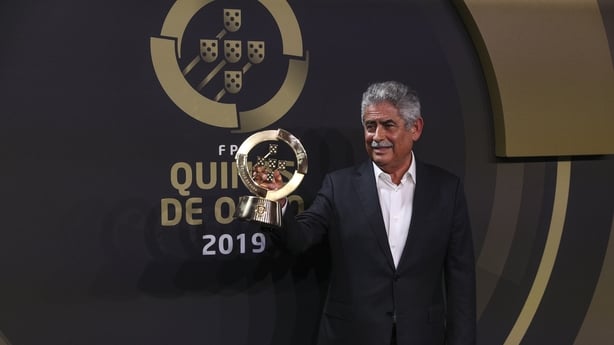In the high-stakes arena of Portuguese football, the return of a familiar figure rarely goes unnoticed, especially when that figure is Luís Filipe Vieira. The former president of S.L. Benfica has officially declared his candidacy for the club`s top office, igniting a fervent debate and casting a long shadow over the current leadership. His recent interview was not merely an announcement; it was a strategic offensive, a self-vindication, and a pointed critique of the man who succeeded him, Rui Costa.
Vieira`s Legacy: A Defense of Dominance and Disputed Narratives
Vieira, ever the assertive leader, wasted no time in defending his past tenure, which he characterized as nothing short of historical. He proclaimed, “I left Benfica fighting for the title until the last minute,” and proudly asserted his role in leading what he dubbed “the second best decade in Benfica`s history,” a period he claims yielded six championships and approximately twenty titles. This retrospective glory served as the foundation for his re-candidacy, a testament to his belief in his own indispensable leadership.
He swiftly rebutted accusations of “dismantling the team” or exhibiting “relaxation” and “lack of investment” during his previous term. His response was direct, almost dismissive: “I never had relaxation in my life.” Furthermore, he offered an intriguing insight into past squad management, specifically addressing the departure of a prominent talent: “Bernardo Silva wasn`t playing, it was a strategy. He is a simple football player, not a manager.” This remark, while seemingly an explanation, could also be interpreted as a subtle, yet firm, reminder of where the ultimate decision-making power resides.
Adding another layer to his defense, Vieira touched upon the thorny issue of external interference in football, stating, “Pinto da Costa knew it was ours. Everyone controlled everything. We are also going to resolve the Setúbal case.” Such veiled references suggest a deeper, more complex narrative of past sporting rivalries and alleged irregularities, hinting at the pressures and unseen battles fought during his presidency. It`s a statement that manages to be both declarative and tantalizingly vague, leaving much to the imagination of a knowing audience.
The Rui Costa Conundrum: From Protegé to Presidential Foe
Perhaps the most captivating segment of Vieira`s discourse revolved around Rui Costa, the legendary player turned club administrator, whom Vieira once championed. Vieira presented Costa as his loyal protégé, cultivated under his wing: “Rui Costa worked by my side. He had defects that I don`t want to talk about here. Three times they told me to kick him out. He was my protected, he was with me. He had enough time to learn and do a good job.” This declaration frames Vieira as a benevolent mentor who defended Costa against internal pressures, only to face what he now perceives as a profound disappointment.
The turning point, according to Vieira, came with Costa`s actions after his own departure. Vieira claims he had foreseen Costa`s potential future in the presidency: “In the last year, I told him `Rui, this will change, you have to accompany me full-time, you can become president`.” Yet, the reality diverged sharply from this envisioned mentorship. Vieira specifically pointed to Costa`s rapid dismissal of Miguel Moreira, a figure Vieira deemed “fundamental,” and critically noted Costa`s willingness to “read that paper they handed him,” implying a lack of independent resolve. Vieira`s stance on the latter was unequivocal: “If he read it, it`s because he wanted to read it. I wouldn`t have read it.” The narrative here is clear: Vieira sees himself as the unyielding, principled leader, contrasting with Costa`s perceived malleability.
The culmination of Vieira`s critique of Costa was stark and direct:
He does not have the quality to be president of Benfica.
This public dismissal, delivered by a man who once fostered Costa`s ascent, underscores the profound schism between the two figures and sets the stage for a dramatic electoral battle.
Navigating the Legal Landscape and Future Aspirations
Vieira`s path to the presidency of the SAD (Sociedade Anónima Desportiva – Sports Public Limited Company) is not without its legal complexities. Despite indications from the CMVM (Portuguese Securities Market Commission) regarding the requirements for such a position, Vieira expressed unwavering confidence: “I have a good lawyer and I decided to run. I think I will be president of the SAD. Don`t worry about it, we have good professionals to put there.” His past arrest, though presented as a temporary inconvenience (“I was arrested, I have no shame, for two days, to give statements”), and his subsequent resignation to facilitate a bond loan for the club, are woven into his narrative as sacrifices made for Benfica`s greater good. A seasoned veteran of club politics, Vieira appears prepared to navigate any bureaucratic or legal hurdles that may arise.
The Road Ahead for Benfica
Luís Filipe Vieira`s candidacy reshapes the landscape of Benfica`s future. His return signals a potential pivot back to a leadership style characterized by strong, centralized authority and a relentless focus on tangible results, even if that means contentious public statements and internal power struggles. The upcoming election is poised to be more than just a vote for a president; it will be a referendum on the club`s identity, its governance, and the very direction it will take in a fiercely competitive footballing world.
As the “Eagles” prepare for this internal contest, the question remains: will the club embrace the return of a figure who promises a reclamation of past glories, or will it seek a path less traveled, free from the echoes of previous boardroom battles? Whether the Eagles soar under a familiar hand or seek new horizons remains to be seen, but the narrative has certainly gained an intriguing, and perhaps tumultuous, new chapter.









